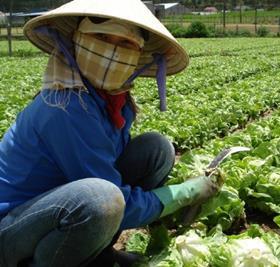
Asia will become the centre for seed development over the next 50 years, according to agricultural consultancy and research & development company Fresh Studio.
The group’s Siebe Van Wijk says ‘modern’ agriculture is relatively young in Asia, and the rise of the professional vegetable seed sector in Asia has only just begun. Therefore the region holds a wealth of untapped market potential, as well as a profusion of prospective seed breeders eager to take the sector forward – whereas in parts of Europe the profession is dying out.
“In general the horticulture revolution in Asia just took off in the past 20 years,” he told Fruitnet.com. “As breeding new varieties takes about eight to 10 years, the rise of the professional vegetable seed sector in Asia has only just started. In the coming 50 years, the whole of Asia will be the place to be for seed companies. There is so much growth in consumption and also so much diversity in vegetables in Asia, that there is a lot of market and work for seed companies.
“In addition there is so much untapped potential of talented, hard working and dedicated future seed breeders, which is more and more difficult to find in Europe. Take for example the Netherlands where hardly any students are studying plant breeding anymore, while the Netherlands is still one of the biggest players in the world for vegetable and potato seeds.”
The current division of labour within the Asian seed market between tropical vegetable seed developers (mostly Asian) and temperate seed developers (mainly Western) is likely to blur over the next 20 years, Mr Van Wijk added, since all major Western seed companies have now set up facilities and programmes in Asia.
In the meantime, though, several hurdles stand in the way of Western seed companies expanding in Asia: namely protecting intellectual property rights, protectionist governments, prohibitive seed costs and limited technology, said Mr Van Wijk.
“All companies face the challenge of protecting their plant breeding rights. This protection is still very weak,” he stated. “Another important challenge is that governments try to protect the domestic seed breeders (which hardly exist in Asia), by placing all kind of restrictions on foreign owned seed companies.
“This is a very short-sighted strategy, from which mostly the vegetable farmers will suffer. I strongly believe that those Asian countries who are able to create a free, fair and enabling market environment for seed companies, irrespective of their origin, will attract a lot of investment in their vegetable seed sector, which in the end will make their vegetable farmers much more competitive then farmers from countries where there is no developed vegetable seed industry.
“The main challenge for Western seed companies in a country like Vietnam, is that farmers are not yet used to higher seed prices,” added Mr Van Wijk. “In addition they do not yet have the right technology mix in place to maximise what is possible with these new and high yielding varieties. There are of course exceptions as there are several modern varieties which also produce very well in open field circumstances.”
In Vietnam, where Fresh Studio has an R&D farm for vegetables and potatoes in the country’s main producer region Dalat, the rise of supermarkets is having a marked effect on the seed sector, according to Mr Van Wijk. They are demanding product diversity, year-round production and better shelf life. For Vietnamese farmers, the standard requirements are resistance to pests, diseases and fungi, and high and fast yields, he said.
“Vietnam is a new market for high quality seeds, so far farmers have only been used to very low seed prices,” explained Mr Van Wijk. “But both for potato and products such as tomato, bell pepper, eggplant, spinach, leek, our tests have shown a lot of value added for local farmers. Farmers have been recognising this.”
In Vietnam, the switch from outdoor cultivation to greenhouse cultivation has yet to take place, he added.
“This will certainly happen in the coming 10-15 years. Prices of land in the prime horticulture areas of Vietnam are already approaching European levels. This is also happening in many other areas of Asia. As a result of the growing demand for high quality and year round available vegetables, there is an enormous incentive to intensify production by switching to greenhouse cultivation.”
Established in Vietnam in 2006, Fresh Studio works as consultant for seed companies, testing their varieties, undertaking market research and helping companies with their marketing strategies.
“For vegetable seeds we have been testing a wide range of varieties ranging from tomato, eggplant, cauliflower, kohlrabi to all the lettuce varieties. For potatoes we have been testing new table potato varieties as well as potato varieties for the processing industry,” said Mr Van Wijk.
“Besides testing the technical and commercial performance of the crop, we also undertook consumer research to see what tastes consumers would prefer. We for example organised focus groups with chefs from hotels and restaurants, during which 14 different potato varieties were cooked and tasted by them. We also organised sales trials at wet markets and supermarkets to see how consumers would react to the products.”






No comments yet